Blog
Insights
Adapting to Change: Duxton Vineyards’ Strategy for a Shifting Industry
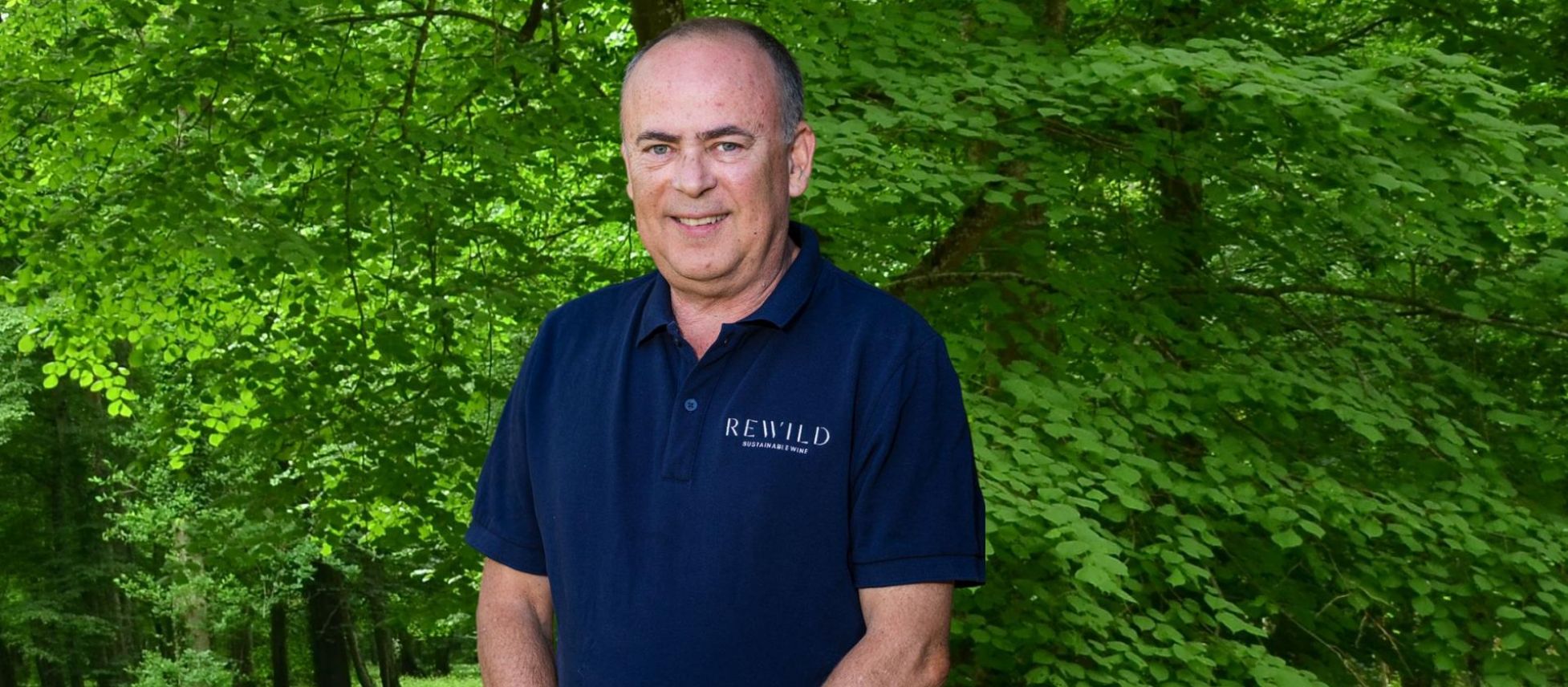
How Duxton Vineyards is responding to demand, supply, and changing tastes.
In a rapidly evolving wine industry, where shifting consumer preferences, oversupply, and economic pressures challenge even the most established players, Duxton Vineyards is carving out its own path. Based in Australia’s Murray Darling region, the company operates on a scale few can match—processing 70,000 tonnes of fruit across 26 varieties—while maintaining a sharp focus on sustainability. As one of the first large-scale producers to achieve Sustainable Winegrowing Australia (SWA) certification, Duxton Vineyards has built its business around the belief that “Great Wine Doesn’t Have to Cost the Earth.”
Beyond sustainability, the company is strategically adapting to market trends. With bulk wine sales at the core of its operations, Duxton Vineyards has expanded its footprint in key markets such as Canada, Europe, and Asia, while also making inroads into emerging markets like India and Japan. The rise of private-label and lower-alcohol wines presents both challenges and opportunities, and Duxton Vineyards is positioning itself to stay ahead of the curve. In this conversation, Tony Allen shares how the company is navigating global market pressures, reshaping its portfolio, and keeping wine relevant for the next generation of drinkers.
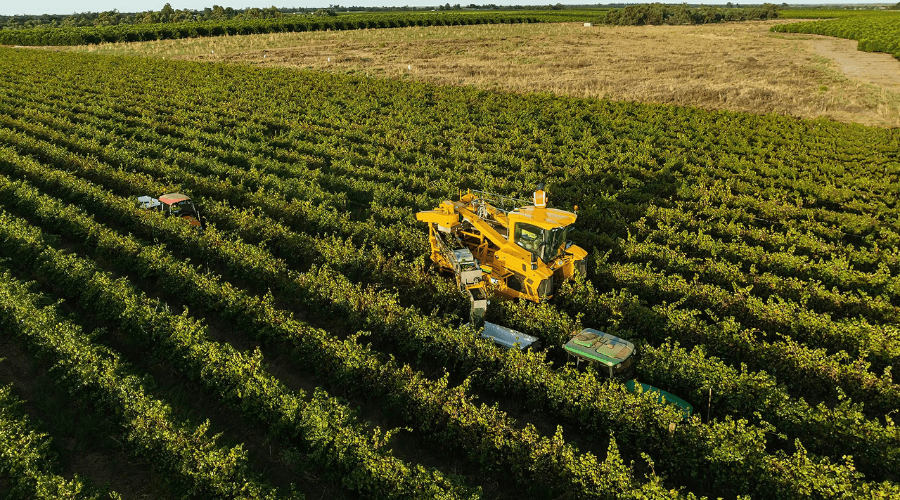
Image: Harvest at Duxton Vineyards.
Could you provide an overview of Duxton Vineyards' bulk wine offerings and the key varieties or styles that set you apart?
Duxton Vineyards is a large grapegrower and winemaker in the Murray Darling region of Australia. We grow 26 different varieties, which totals around 70,000 tonnes of fruit once all processed. Duxton Vineyards were one of the first large winemakers to attain a SWA certification (Sustainable Winemaking Australia). Sustainability and regenerative farming are at the forefront of all of our business decisions. Sustainability is becoming more important to our customers and we take pride in our approach to create “Great Wine Doesn’t Have to Cost the Earth”. Our winemaking strategy is to let the fruit shine. We are trying to make fruit-forward, consumer-friendly wine for early release. The wines are also incredible value for money. We have several brands which are working well for us in different markets around the world. Rewild is a sustainably certified brand which celebrates our environmental focus of giving back to nature more than we take out. This brand is sold domestically in Australia, has been released into Canada in partnership with Andrew Peller Wines, and also sells throughout Asia. Our Pete’s Pure range is our largest on-premise brand, which sells in Australia, Europe, and is growing exponentially in Asia. We have also recently released Pete’s Pure into the Indian market. Solara is another SWA certified brand and sells mostly in Australia. We also offer Buyers Own Brand and sell large amounts of wine in bulk both domestically and internationally. Duxton Vineyards also has a partnership with a de-alcoholisation plant on our site and we are exploring no and low alcohol wines for our own brands and our customers.
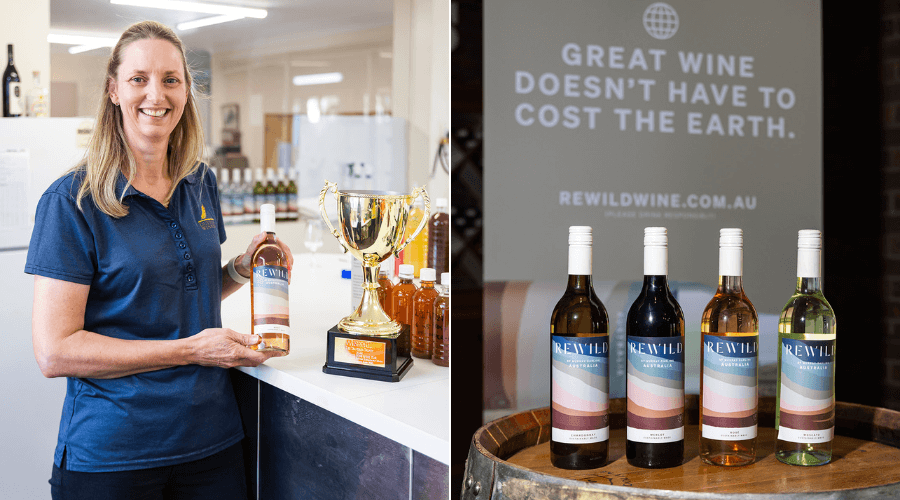
Image: (Left) Winemaker Angela Allen and (Right) the Rewild Brand.
What are Duxton Vineyards’ primary markets for bulk wine sales, and have you noticed any significant shifts in demand in recent years?
Our biggest export market is Canada. We have a strong history of selling bulk wine into Europe and Asia, and over the last year we have increased our volume of bulk wine into California. Australia certainly has seen a reduction in bulk red demand in recent years. This is partly due to reduced consumption, global supply and demand, and the Chinese tariffs on bulk wine. White demand remains strong.
Are there any emerging markets or evolving consumer demographics that Duxton Vineyards is targeting for future growth?
We are certainly working to expand the footprint of our brands in the Indian market. India has a younger population with growing affluence and we believe our brands will be well received and successful over there. Japan has been another excellent market for us in recent years and we plan to build on this momentum and continue our growth in this market also.
With global wine consumption patterns changing, how is Duxton Vineyards adapting its bulk wine portfolio to meet the needs of new markets and evolving consumer preferences?
We are looking at how we can balance our supply with demand, by reducing varieties that are currently selling at low prices due to oversupply in the global marketplace. Shoppers seem to be looking for lighter, lower alcohol wine styles so we need to adapt to consumer preferences.
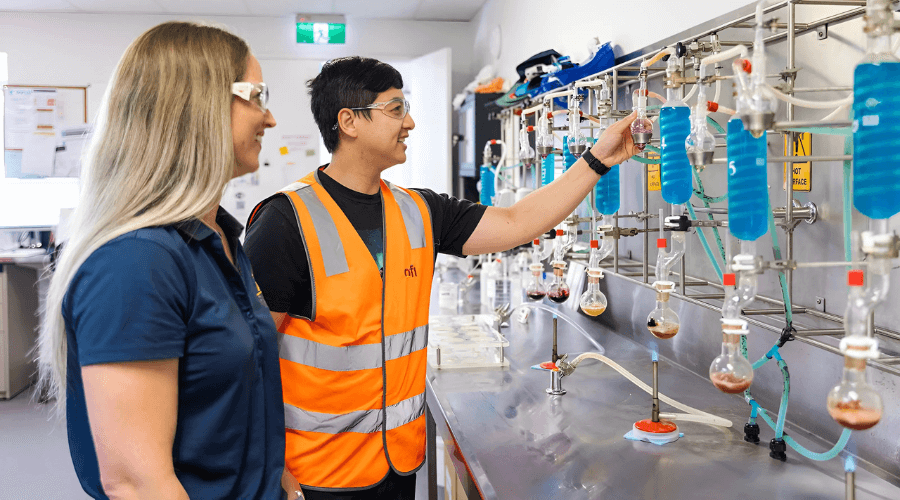
Image: The Duxton Vineyards Lab.
Private label and custom-made bulk wines are gaining traction. How has Duxton Vineyards leveraged this trend to expand its market presence?
At Duxton Vineyards, 90% of the wine we make is sold as bulk wine. We do make bottle ready wines for several large customers, whereby we deliver wines in finished state directly to the bottling line where they are bottled under someone else’s label.
The global wine industry is grappling with challenges such as declining consumption and oversupply. How is Duxton Vineyards positioning itself to navigate these issues while maintaining its market strength?
Five years ago, we would make red wine without confirmed buyers as we knew we would be able to sell overseas with a good margin. This year, however, we are only crafting enough wine to cover our contract volumes. This is in part due to current low pricing on bulk red wine in Australia. We will also look to re-develop parts of our vineyard to accommodate varieties which have a strong demand both domestically and internationally.
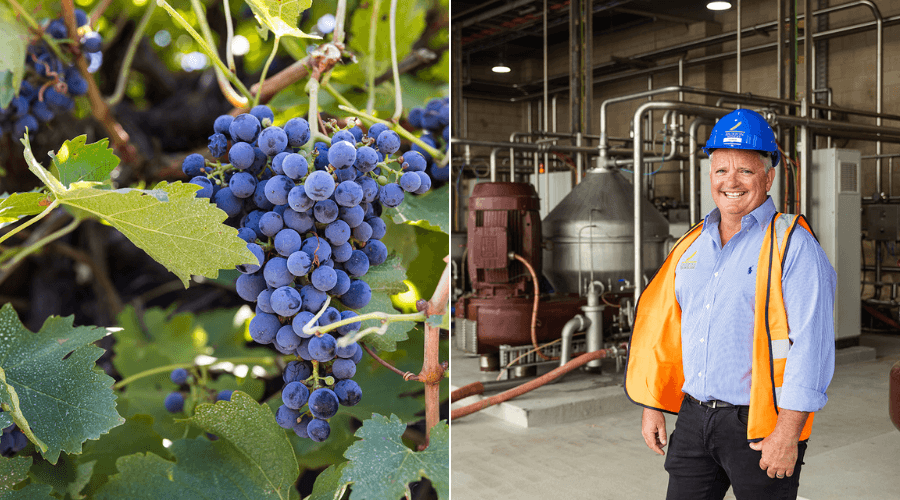
Image: Duxton Vineyard and Winery.
Looking ahead to 2025, how would you describe the state of the bulk wine market, and what key trends do you see shaping its future?
The wine industry is still a difficult marketplace where oversupply and low pricing are making it hard for winemakers and growers to make a decent living. The industry needs to make wine sexy again. Young consumers have so much choice these days and wine has a lot of competition, not only amongst ourselves, but from other alcohol categories and products. People are also becoming more health conscious, moderating their alcohol intake. I think this has led to a reduction in red wine consumption, whereby people are now looking for lighter, less alcoholic styles of wine. Over time, I believe there will be a good market for alcohol reduced wines, and although this may take some time to gain in popularity, it is a trend I foresee shaping the future of the industry.
[[relatedPurchasesItems-62]]
Conclusion:
As the global wine industry grapples with oversupply, declining red wine consumption, and evolving consumer expectations, Duxton Vineyards is taking a measured yet forward-thinking approach. Rather than overproducing in an uncertain market, the company is refining its focus—matching supply with demand, re-evaluating its vineyard portfolio, and expanding into growth areas like low-alcohol and white wines.
Yet, beyond the numbers and strategies, Tony Allen raises a broader question: how does the industry make wine compelling again? With younger consumers faced with endless choices, the wine sector must compete not just within itself, but against a growing landscape of alternative beverages. The answer, perhaps, lies in a combination of sustainability, accessibility, and innovation—areas where Duxton Vineyards is already making its mark.
In conversation with Malvika Patel, Editor and VP, Beverage Trade Network
Also Read:
Building Global Success: ECA Chair Dianne Tipping on Australian Wine and Spirits Exports
Savoring Success: Wine Australia's Strategies for US Market Growth
Australian Wine Importers Leading the Charge in Bringing Aussie Wines Stateside
If you're a bulk wine or bulk spirits supplier, contract bottler, or private label producer aiming to connect with serious trade buyers, IBWSS San Francisco is the event you can't afford to miss. Get a quotation or Book a exhibitor table.

